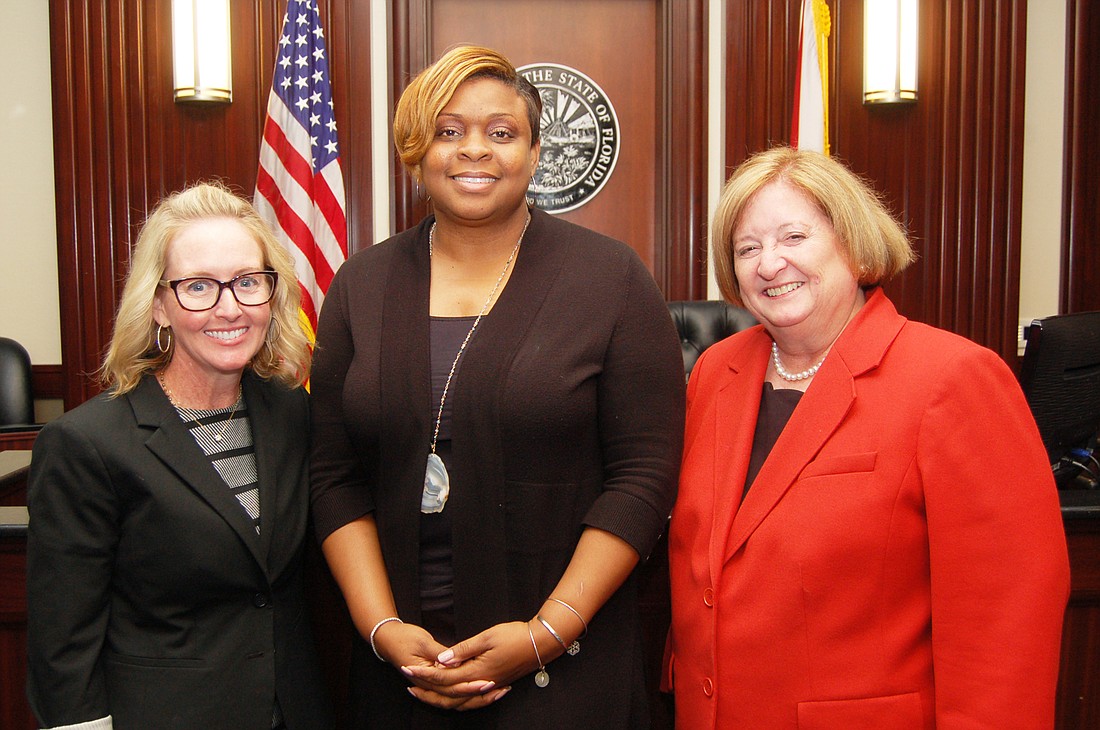
Students learn a lot in three years at law school, but there’s more to learn after they pass the Bar exam and begin practice in the courtroom.
That was the topic for “Bench Brief: Rookie Mistakes to Avoid as a Young Lawyer” on Tuesday during The Jacksonville Bar Association Young Lawyers Section’s annual “Afternoon at the Courthouse” CLE program.
About 50 of the newest attorneys in the 4th Judicial Circuit heard advice and insight from Circuit Judges Angela Cox and Karen Cole and Duval County Judge Dawn Hudson.
Each stressed the importance of decorum, professionalism, preparation and communication — starting as soon as court is called to order.
“Introduce yourself to the judge and say who you represent,” Cole said.
She also advised young attorneys to address the court, not opposing counsel, and refrain from talking when someone else is speaking because that makes it difficult for the stenographer to accurately record the proceedings.
Cox advised the attorneys to spend some time in court observing to learn how each judge handles the docket and to become familiar with a judge’s preferences on issues, such as the use of cellphones or tablets, while court is in session.
“Some judges allow them and some judges don’t,” she said.
“When in doubt, ask the judge,” Cole said.
One skill young lawyers need to learn is how to react if opposing counsel makes a misrepresentation.
“Be professional. When it’s your turn to speak, point out that your recollection is different,” Cole advised.
“Often, the opposing attorney isn’t trying to be devious. Don’t assume there is malice behind a mistake,” she added.
The judges also had advice for when a young lawyer’s opposing counsel isn’t an attorney, but someone who is representing themselves in a hearing or court.
“Don’t underestimate a pro se litigant,” Hudson said. “Sometimes, they stumble upon some really good things.”
Cole said it’s her experience that people who represent themselves in court generally fall into one of two categories: those who aren’t represented by an attorney for financial reasons and those who are “unbalanced.”
“If they’re in the second group, be polite, but don’t expect to build any bridges. If they’re in the first group, think about if you went into surgery not knowing anything about it,” she said.
Asked to explain the difference between a good lawyer and a great lawyer, Hudson said intelligence is important, but no more so than demeanor. “It’s the way you treat the other side,” she said.
Cox cited preparation as a trait of a great lawyer.
“They go above and beyond. Proofread. Take the extra steps to make sure you are prepared,” she said.
The judges encourage young attorneys to consider pro bono services and philanthropy early in their careers, with a caveat.
“At first, concentrate on doing a credible job, then find an area of volunteer service that makes you feel good,” Cole said.